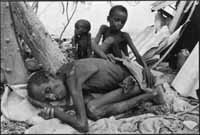More than 115 dead in cholera outbreak in Somalia, violence continues in capital
A cholera outbreak in Somalia has killed more than 115 people and hospitalized 724, medical officers said Wednesday, while the capital was hit by more violence.

Tests conducted by the international medical aid group Medecins Sans Frontiers confirmed the cholera outbreak in towns along the Shabelle river. The river flooded earlier this year, leaving tens of thousands homeless in a country with little ability to respond because it lacks effective government.
"At least 115 people, 53 of them children, have died from cholera in four districts in the last four weeks," said Dr. Abdulahi Hussein Malin, who works in a hospital in Jowhar, 90 kilometers (55 miles) north of Mogadishu.
Infants have been especially affected, said Dr. Hawo Abdi Mumin, who works with the Somali Red Crescent Society.
"People use water from the river, which is contaminated because of the floods, because they have no access to clean water," she said.
In the capital, Mogadishu, four people were killed on the streets by unidentified gunmen in separate incidents, police said. The motive in each case was not immediately clear.
Later Wednesday, Deputy Defense Minister Salad Ali Jelle said that the police seized a cache of arms, including 27 mortars, a number of land mines and ammunition for anti-aircraft weapons. They arrested three suspects, all Somalis, Jelle said. He said the cache was found in a house in southern Mogadishu, where a former military barracks used to be.
Unidentified attackers fired a mortar round near the presidential residence in the Somali capital late Tuesday, said Ali Sa'id Hassan Awale, the police chief of Mogadishu. No one was injured.
Efforts toward broad-based talks to stabilize Somalia received a blow Tuesday when President Abdullahi Yusuf told the Yemeni News Agency he would not hold talks with a moderate leader of Somalia's ousted Islamic movement, Sheik Sharif Sheik Ahmed, who is in protective custody in Kenya and may seek asylum in Yemen.
The city has seen spiraling violence over the past month following the ouster of Somalia's Islamic movement that controlled the capital and much of southern Somalia. The ousted Islamic movement, which still has strong support in Mogadishu, has vowed to wage an Iraq-style insurgency. Clan rivalries also are a challenge for the government.
Various donors have pressed the Somali government to reach out to moderate elements of the Islamic movement to stabilize Somalia. Some diplomats have suggested Ahmed is important to such a development.
"We will not talk with him (Ahmed)," Yusuf told the Yemeni News Agency in the Somali capital. "As I have said, he is one of the top leaders of the disaster group," referring to the Islamic movement.
On Monday, the government began a weeklong meeting with the elders, traditional chiefs, representatives of private aid and development groups in Mogadishu as part of promised efforts to reconcile Somalis after 16 years of conflict.
Mogadishu and much of southern Somalia has borne the brunt of the country's conflict that began in 1991 when clan-based warlords toppled dictator Mohamed Siad Barre and then turned on one another, sinking the Horn of Africa nation of 7 million people into chaos.
A Yemeni foreign ministry official said that three moderate leaders of Somalia's Islamic movement were already in Yemen and have met with Yemeni officials and U.S. diplomats, reports AP.
Yusuf said his government was willing to offer amnesty to the Islamic movement's fighters if they renounced violence. But its leaders, he said, "will not be given amnesty because they had caused Somalia's breakdown and destruction. We will not forgive them or reconcile with them."
The two-year-old transitional government, formed in 2004 with U.N. help, only managed to establish itself in the capital in December. It has struggled to assert authority and heal clan rifts, and was confined to Baidoa until Ethiopian troops arrived to help oust the Islamic movement.
Subscribe to Pravda.Ru Telegram channel, Facebook, RSS!





